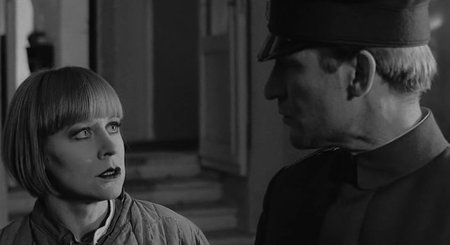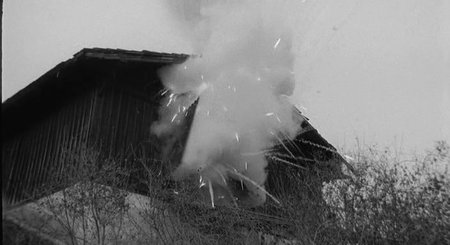En total las víctimas suman una cifra de 15.510.000 a 22.450.00(quince a veinte millones de personas, aproximadamente).

martes, 27 de noviembre de 2012
Der Fangschuss
Latvia, 1919, at the height of the Soviet Civil War. Margarethe von Trotta plays an aristocrat sympathetic to the Communist cause. Besides her ruinous habit of falling in love with men who do not love her, Margarethe's tragic flaw is her refusal to acknowledge the cost of the revolution in terms of human lives. Letonia, 1919: apogeo de la guerra civil rusa. Una joven aristócrata se enamora de un oficial prusiano sexualmente reprimido. Cuando es rechazada por su amor, la joven se hunde en una espiral descendente de depresión, promiscuidad y colaboración revolucionaria. IMDB Volker Schlöndorff had first come across Marguerite Yourcenar's novel "Der Fangschuss" in 1965 while working on his film TÖRLESS. Even then, he had been attracted by the idea of making a film based on the novel by an author who had become famous for her historical novels and was the only woman in the Académie Française. DER FANGSCHUSS follows on from TÖRLESS in both form and content, both films displaying the same respect and caution towards the literary original; both are produced in black-and-white and both are basically about suppressed sexuality and reactionary behaviour with the aim of revealing sadomasochistic relations and fascist tendencies. Volker Schlöndorff has by no means left the political arena to concentrate on a historical subject or purely human problem in this film, which was produced one year after the sensational success of DIE VERLORENE EHRE DER KATHARINA BLUM; the "problematical relationship between men and women" portrayed by the film in the form of a highly dramatic affair is closely related to the social and historical background of a struggle between supporters of the old order and the supporters of new social ideas. Sophie is not only driven to join the rebels by Erich's emotional coldness and the humiliating realization that he used her to come closer to her brother, but also by her revulsion of war and the male solidarity among the officers, as well as by the realization that they need the war "in order to live out their lives" and satisfy their secret cravings. With their black-and-white shading and their grey tones reminiscent of the films produced by Jean-Pierre Melville, Schlöndorff's "first mentor" to whom this film is dedicated, these images evoke a decaying, dying world in which real, open relations between people have become impossible. This gives DER FANGSCHUSS a dramatic presence making the historical situation transparent to the present on at least an emotional level if not on an intellectual plane. It is a powerful film, full of noise and furor. Ripped with MeGUI from the Criterion Collection DVD Con Tiro de gracia, definida por el director como "la historia de una humillación culminada en una revuelta", Schlöndorff creó una obra en blanco y negro austera y rigurosa a partir de la novela de Marguerite Yourcenar donde desfilan temas como la decadencia de la burguesía, la represión de la mujer y la liberación de ésta a partir de un acto extremo. La protagonista, Sophie von Reval (de nuevo Trotta) es una aristócrata de carácter complejo que en la Rusia revolucionaria se pone del lado de los rojos, hecho que le hace vivir intensamente hasta el momento de solicitar su propia muerte. La película de Schlöndorff es una extraordinaria descripción sobre la corrupción y la debilidad de las creencias en que una familia aristocrática se sustenta: la complejidad de los acontecimientos en Kratovice (donde sucede la acción), la diversidad de sentimientos (desviación de ideas, desviación sexual) y la contradicción en los comportamientos de los personajes exigieron un trabajo de puesta en escena modélico repleto de contracampos, primeros planos, miradas y contra-miradas entre los personajes y espejos que multiplican las figuras. Script/Guión: Jutta Brückner, Margarethe von Trotta, Geneviève Dormann (Novel: Marguerite Yourcenar) Music/Sonido: Stanley Myers Cinematography/Fotografía: Igor Luther (B&W) Cast/Reparto: Margarethe von Trotta, Matthias Habich, Rüdiger Kirschstein, Marc Eyraud, Bruno Thost, Frederik von Zichy, Valeska Gert, Mathieu Carrière
peliculas, documentales, vida real, remembranzas
Der Fangschuss
Suscribirse a:
Enviar comentarios (Atom)







No hay comentarios:
Publicar un comentario